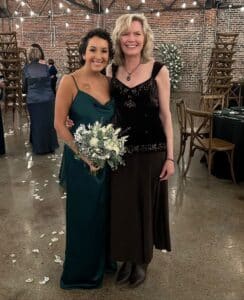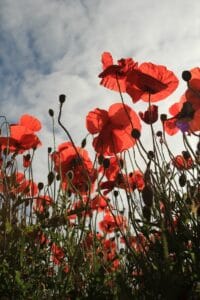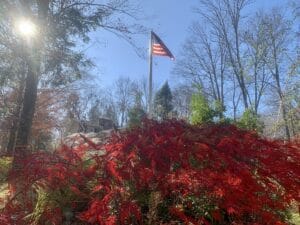Hello, fellow lovers of all things green,
It was confusing the day before Veterans Day this year. Folks were off, and schools closed. I thought it was always on November 11. There’s a significance to 11-11, and why poppies are on lapels on Veterans Day and in our garden.
So, I dug into why it was a day early. The Hill.com writes that we were observing Veterans Day on November 10 as a federal holiday because the date fell on Saturday, giving many a three-day weekend. I hope the Federal holiday shift does not continue and we lose the day’s significance.
The History of Veterans Day
Veterans Day is rich in history. While World War I officially ended with the Treaty of Versailles on June 28, 1919, combat ended seven months prior. A truce, an armistice, was agreed upon between Germany and the Allied Nations. It went into effect on the Eleventh Hour of the Eleventh Day of the Eleventh Month of 1918 and is considered the end of “the war to end all wars” —coined after The War That Will End War by H. G. Wells, published in 1914. If only that were the case.
President Wilson declared November 11, 1919, the first Armistice Day, and it became a legal holiday in 1938. The name changed to Veterans Day in 1954 to honor all American veterans of all wars. The date once floated to make a three-day weekend like Memorial Day, Columbus Day, and Washington’s Birthday, but that changed in 1975 under President Ford.
The U.S. Department of Veterans Affairs explains, “The restoration of the observance of Veterans Day to November 11 not only preserves the historical significance of the date but helps focus attention on the meaning and importance of Veterans Day.
We honor our men and women for their service and sacrifice with humble gratitude for our freedom.
How poppies became a symbol of Veterans Day stems from a powerful poem titled Flanders Fields, the name given to World War I battlefields from southern Belgium to north-west France. Flanders Fields is famously read at veteran’s memorial services.
About Flanders Fields
While there are different versions of the story, the most common is that Lieutenant-Colonel John McCrae was inspired to write Flanders Fields after presiding over a friend and fellow soldier’s funeral, Lieutenant Alexis Helmer. According to legend, soldiers retrieved the poem after McCrae, dissatisfied with his work, threw it out.
First published in London’s Punch magazine on December 8, 1915, Flanders Fields starts with “In Flanders Fields, the poppies blow. Between the crosses, row on row…” McCrae’s handwritten version reads, “In Flanders Fields, the poppies grow.” And grow, they do!
Poppies in the garden symbolize different things.
Poppies have mixed meanings: the traditional red symbolizes remembrance, healing, and eternal life. Creamy white signifies peace and restfulness. While pink, purple, and blue hues represent creativity, accomplishment, and generosity.
I adore how the alien-looking poppy flower pods ascend from hairy stems on spikey fern-like leaves before bursting into vibrant bowl-shaped blooms. They like average to sandy soil, not clay, full sun to part shade, and are drought tolerant once established. And they are deer and rabbit-resistant!
I stumbled upon a song, Turn Off The News (Build A Garden). by Lukas Nelson & Promise of the Real. A few of the lyrics— I believe that every heart is kind. Some are just a little underused. Hatred is a symptom of the times lost and these uneducated blues. Turn off the news and raise the kids. Give them something to believe in. Teach them how to be good people. Give them hope that they can see, turn off the news, and build a garden with me.
Perhaps we can change the words to – stop the violence and build a garden of peace and love with me. Imagine that. Happy Thanksgiving.
Garden Dilemmas? AskMaryStone@gmail.com and your favorite Podcast App.

Sammi Stone in restored health – Thank you for your prayers from the bottom of my heart.
There’s much more to the story in the Garden Dilemmas Podcast. Including an update on my niece-in-law Sammi. Thank you for your prayers from the bottom of my heart. The personal story is at the end of the story on the Mystery of Mutating Alberta Spruce.
More about Poppies:
We all know the scene in The Wizard of Oz when the field of poppies puts Dorothy and her friends to sleep. The annual poppies (Papaver somniferum) are what make opium. The same plant is the source of poppy seeds that adorn bagels. However, ninety percent of the opiate residue dissipates during processing.
There are annual and perennial poppies.
The annual Common Poppy (Papaver rhoeas) is in Flanders Fields. Folks also call them corn or field poppies due to their proliferation as an agricultural weed. If you have pets or kids who tend to eat things they shouldn’t skip the poisonous annual poppies.
Iceland Poppy (Papaver nudicaule) are hardy perennial poppies in Zones 2 through 9. They, too, are toxic, though the toxicity level is low. While short-lived, they self-seed readily, assuring generations of these beauties.
No Man’s Land
Ken Roberts, my singing partner for Karen Ann Quinlan’s Home for Hospice, sent a link to a song referencing Flanders Fields titled No Man’s Land, also known as The Green Fields of France or Willie McBride. Written by Scottish folk singer-songwriter Eric Bogle in 1976, the lyrics about a nineteen-year-old fallen soldier bring me to tears.
One chorus starts with, “Well, the sun’s shining now on these green fields of France; The warm wind blows gently, and the red poppies dance. The trenches have vanished long under the plough. No gas and no barbed wire, no guns firing now.”
Let us never forget or take for granted our veterans’ service and those who gave the ultimate sacrifice.
Link to No Man’s Land
You’ll enjoy the previous column featuring the Wizard of Oz titled Chasing Rainbows and Leaves.




